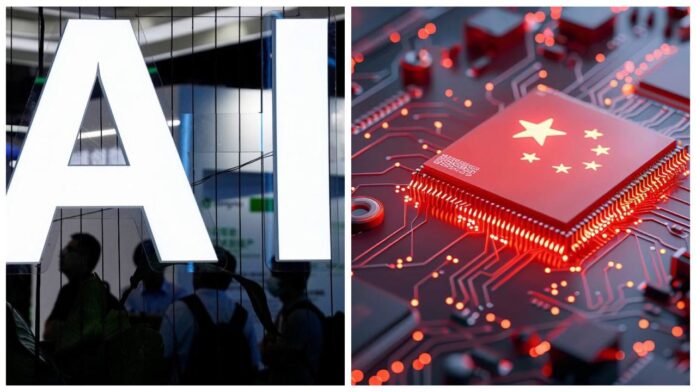Fresh from the global success of DeepSeek’s newest artificial intelligence reasoning system, China’s highest-ranking economic officials vowed to create a state-financed fund to support technological innovation.
The “state venture capital guide fund” will focus on frontier areas such as artificial intelligence, quantum technology and hydrogen energy storage, Zheng Shanjie, chief of China’s state economic planner, stated Thursday on the sidelines of the annual sessions of China’s rubber-stamp national legislature and advisory body.
The fund will likely draw nearly 1 trillion yuan ($138 billion) of capital from the private sector and local governments over 20 years, National Development and Reform Commission Chairman Zheng said.
Chinese policymakers consider high-end chips, quantum computing, robotics and artificial intelligence as pivotal drivers for boosting economic growth and improving manufacturing. China is under mounting pressure from US technology curbs.
Zheng used a defiant tone at the news conference, commending China’s rapid advances in microchips and AI giant language models and industrial robots and humanoid robots.
“Certain scenes that were previously only in science fiction are now becoming a reality. We are slowly moving towards the frontiers of technology and innovation in the world,” Zheng said. “This is precisely what confirms that the attempt at suppression and blockade by certain forces can only accelerate our pace of independent innovation,” he went on in an apparent reference to the United States.
DeepSeek, a privately owned company whose R1 large language model roiled global stock markets when it was introduced in January, was able to nearly match the capabilities of its rivals – including OpenAI’s GPT-4, Meta’s Llama and Google’s Gemini — but at a fraction of the cost.
That surprised bystanders because the US has attempted for years to restrict access to high-power AI chips to China on national security reasons. That means DeepSeek supposedly operated its low-cost strategy on relatively under-powered AI chips.
Chinese Premier Li Qiang on Wednesday pledged to “cultivate emerging industries and future industries” while reading the government’s annual work report. Li pledged to establish a mechanism that would increase financing to industries such as bio-manufacturing, quantum technology, embodied AI and 6G technology.
Driving consumption
In response to decades of emphasizing technological development over domestic consumption, China’s leaders have now also begun to focus on enhancing consumption as their top policy priority. The government will in the near future publish a “special action plan to stimulate consumption,” said Zheng, the economic official.
Last year, even with a September stimulus boost, most of the nation’s growth momentum was fueled by exports, which drove China’s trade surplus to a record high of nearly $1 trillion. That resilience has irritated US President Donald Trump, who this week doubled US import tariffs on Chinese products to 20%.
China’s home consumption as a share of the country’s gross domestic product (GDP) was just 39% in 2023, the most recent year available, according to the Macquarie Group, an investment bank. That compared with 49% in South Korea and 55% in Japan, two of Asia’s high-saving economies, and 68% in the United States.
Beijing is seeking to draw strength from within amid increasing external uncertainties. China is launching special measures to stimulate domestic consumption,” HSBC economists led by Jing Liu wrote in a research report on Wednesday.
As part of that effort, China raised its budget deficit to around 4% of gross domestic product, Premier Li stated in his work report. It was the highest in decades and as part of a plan to speed up spending in an effort to counter the shock of US tariffs.
He also stated that the quota of local governments to issue bonds would be raised more than 25% from the previous year to 6.2 trillion yuan ($855 billion) for the local and central governments.
The special bonds issued by local governments will be used to finance infrastructure investment and help stabilize the troubled housing market, whereas central governments would spend about 300 billion yuan ($41 billion) on investing in consumer subsidies for a popular “cash-for-clunkers” exchange program for cars and consumer electronics.
Most important to the government’s achievement will be whether it can get China’s private entrepreneurs to stir back to life their “animal spirits,” which will need to lead technological innovation as Beijing prepares for additional curbs from Washington.
Over the past month, Chinese president Xi Jinping welcomed the country’s highest technology leaders in the capital city, where he said that it was “prime time” for private companies “to give full play to their capabilities.”.
Private companies generate over 60% of China’s GDP and over 80% of employment, although they are dwarfed by the state sector in size. Nevertheless, the majority of companies, particularly in the technology sector, are rebounding from a suffocating regulatory crackdown that had lasted for more than three years.
The Private Economy Promotion Law, to be considered at the current “two sessions” political sessions, would defend and support companies under the law, according to Yang Decai, head of the Private Economic Research Institute at Nanjing University and member of an advisory committee to the legislature.
It “responds very actively and well to certain issues that the private sector is concerned about, such as the safeguarding of property rights, fair competition,” he told journalists on Tuesday at the Great Hall of the People in Beijing. “That has reinforced the confidence of private business and our expectation of the market, which is of particular significance to the stable development of the Chinese economy.”


